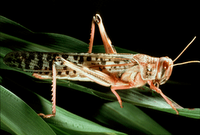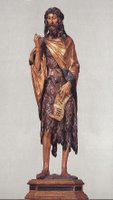Food for Thought 3: Eating Insects
Q: In Leviticus 11:20-23, God spoke of insects as food: “Yet among the winged insects that go on all fours you may eat those that have jointed legs above their feet, with which to hop on the ground. Of them you may eat: the locust of any kind, the bald locust of any kind, the cricket of any kind, and the grasshopper of any kind. But all other winged insects that have four feet are detestable to you.”
My problem is that there are no four-legged insects. God created insects — wouldn’t He know how many legs they have? How can this be explained?
 A: None of my resources go into any detail as to why this wording is used; only a few even note the obvious difference in the number of legs. Thus, I’m forced to offer an educated guess. Since these are being compared with various other clean and unclean animals, I take “all fours” to stand for walking bugs as opposed to those that crawl about. This could come from the fact that many walking insects have two hopping legs that might be are considered separately from the other four.
A: None of my resources go into any detail as to why this wording is used; only a few even note the obvious difference in the number of legs. Thus, I’m forced to offer an educated guess. Since these are being compared with various other clean and unclean animals, I take “all fours” to stand for walking bugs as opposed to those that crawl about. This could come from the fact that many walking insects have two hopping legs that might be are considered separately from the other four.For many people, the very idea of eating a locust — or any insect — let alone having it declared good to eat, seems strange. Yet among the foods that are allowed or disallowed to Israel, here we find them listed.
This chapter begins a major shift in the theme of Leviticus. The first ten chapters deal primarily with atonement, forgiveness, and cleanliness. Most of the rest of the book deals with what defiles or makes unclean God’s chosen people. Areas of concern include diet, disease, personal relationships, birth, and death. Thus, they deal less with how God forgives and deals with a sinful people in grace (justification) and more with how God’s people act in response to His grace (sanctification).
While the other classes of living creatures include some general summary of what makes them “clean” or “unclean,” the only insects or other creeping things allowed are those mentioned specifically in verses 20-23. While God doesn’t explain Himself, and while His treatment of certain animals seems arbitrary to human understanding, setting these particular creatures aside as permitted food makes sense. When we look at the other creatures, we see that predators and scavengers are generally excluded. The diet of these locusts, grasshoppers, and crickets is exclusively vegetarian and they would not be associated with having come into contact with either dead creatures nor to have eaten the blood of a living creature — both of which also were acts that caused defilement for Israel.
Many of the dietary and other commands don’t appear to be health-related. Instead, they are “worship-related”; that is, they are ways in which God separated the children of Abraham, Isaac, and Jacob from the surrounding nations. God took away from Israel many of the options in dress, eating, and other behavior that were allowed to the children of Adam and those of Noah and all their descendants. This was part of their being set aside.
 Among this people God set apart, He called a select few to special service. Among these was the most famous “bug eater” in Scripture, John the Baptizer. Along with his “garment of camel’s hair and a leather belt around his waist,” people recognized this special messenger of the coming Christ because of his diet of “locusts and wild honey. (Matthew 3:4)”
Among this people God set apart, He called a select few to special service. Among these was the most famous “bug eater” in Scripture, John the Baptizer. Along with his “garment of camel’s hair and a leather belt around his waist,” people recognized this special messenger of the coming Christ because of his diet of “locusts and wild honey. (Matthew 3:4)”As Christians, we realize that God, through Moses, gave this portion of the “Levitical Law” exclusively to Israel. Just as the other 600-odd individual laws or commandments in Leviticus, Exodus, Numbers, or Deuteronomy pertained specifically to the Hebrew people, so also these dietary regulations.
Christians, however, aren’t bound by God’s Law in most of these areas — only a handful of the commandments to Israel are reenforced by Christ or His apostles in the New Testament. Yet even in freedom, Christians still have specific responsibilities, best summed up by Saint Paul: “So, whether you eat or drink, or whatever you do, do all to the glory of God. (1 Corinthians 10:31)”
Scripture quoted from The Holy Bible, English Standard Version™, © 2001 by Crossway Bibles.
Send email to Ask the Pastor.
Walter Snyder is the pastor of Holy Cross Lutheran Church, Emma, Missouri and coauthor of the book What Do Lutherans Believe.
Technorati Tags: diet | insects | bugs | Israel | John the Baptizer | John the Baptist

1 Comments:
It seems to me that "insect" is a modern day word which we understand to mean exclusively, "a six legged" icky thing.
So does the Hebrew word here actually mean "insect" or is it just the Hebrew equivalent for "bug"?
Post a Comment
<< Home